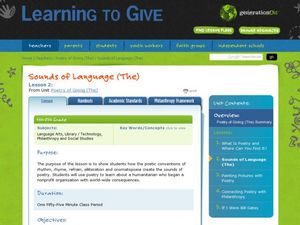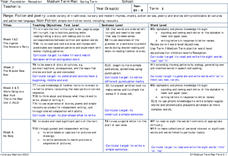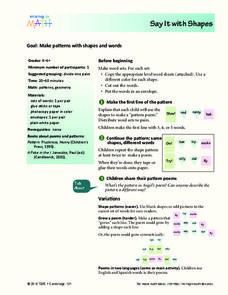University of North Carolina
Poetry Explications
Explication may sound like a fancy word, but it's just a fancy way to say analysis. Using a handout on poetry explications, part of a larger series on specific writing assignments, writers learn how to break down and analyze a poem. The...
Curated OER
Do You Want to Be My Friend?
Learners participate in a variety of emergent and early-literacy activities based on a "friendship" theme. Learners listen to the book Do You Want to Be My Friend by Eric Carle, then echo read, choral read, and independently read...
Math Can Take You Places
Picture This
Engage scholars in a ratio lesson that employs real-world scenarios. Learners will compare the length and width of pictures and use a table to identify ratio patterns. They watch "Math Can Take You Places" and discuss jobs that use math...
Curated OER
The Poetry of Giving
Learn about philanthropy and poetic conventions with an inclusive lesson about Bill Gates. After learning about Mr. Gates' humanitarian efforts in the world, sixth graders use alliteration, onomatopoeia, rhyme, rhythm, and refrain in...
Curated OER
Visual and Number Patterns
Fourth graders develop strategies for identifying geometric and number patterns. In this mathematical patterns lesson, 4th graders use pattern blocks to make repeating patterns with numbers and shapes. Students then explore number...
K12 Reader
The Thin Pin Can Spin
Words that end with -in are the focus on this learning exercise. Learners read a short poem that includes quite a few -in words to identify and practice and then answer three reading comprehension questions.
K12 Reader
He Must Take the Bus
Build your youngsters' knowledge of the short /u/ sound with a quick exercise. Class members read a brief poem designed to include many words with the short /u/ sound and then answer three reading comprehension questions about the...
Poetry4kids
Rhyme Schemes Lesson Plan
Scholars read four brief poems and analyze their word usage in order to identify the rhyme scheme.
Curated OER
Patterns
Fourth graders investigate patterns and sequences. In this patterns and sequences lesson, 4th graders use a hundreds chart to build recurring patterns. Students skip count by threes and fives on a hundreds chart by coloring multiples...
Curated OER
Fiction and Poetry
Pupils explore fictional text and poetry. They explore the story structures used in the types of texts and examine the language patterns used. Students practice tracking text in the correct manner.
Curated OER
Pattern Detectives
Students discover patterns in language, math and science. They experience patterns by hearing stories, and becoming pattern detectives.
Curated OER
Buggy Patterns
First graders discuss the definition of patterns, and sing the song, Going Buggy, identifying patterns in the song. They create original patterns using bug counters and insect stickers.
K12 Reader
The Note Was in Code!
While it's quite an ode, this short poem uses the long /o/ sound repeatedly in words like code, note, alone, and phone. Kids read the selection and answer three comprehension questions about the text.
K12 Reader
The Kid Will Win a Ship
Which word included the short /i/ sound: pirate or ship? Work on the short /i/ sound with your class by using the short poem provided here. Class members read the poem and answer three reading comprehension questions.
K12 Reader
The Cat on the Mat
Everyone likes a poem about a cat, especially when it includes other rhyming words that end with -at! Kids read the lines and then respond to three reading comprehension questions.
California Federation of Chaparral Poets, Inc
Poetic Devices
Have everything you need to know about the elements of poetry with a nine-page handout. Split into four categories—word sounds, meanings, arrangement, and imagery—budding poets may reference terms, read definitions, descriptions, and...
Curated OER
Mouse Mess
Scholars practice rhyming and phonemic awareness using trade books and poetry. They will listen to the book Mouse Mess several times throughout the week, identifying rhyming words, and matching words that begin with the same sound. Then...
Curated OER
Poetry: Ten Little Schoolchildren
Students analyze a sequential, story poem and put the stanzas in order. They identify repeated verses and answer questions about the poem. They identify examples of alliteration. Finally, they make their own poem in a given pattern.
K12 Reader
She Needs Less Shell
Supply your pupils with some practice of the short /e/ sound. They read brief poem that includes several examples of words that include this sound. Once they are finished reading, class members respond to three reading comprehension...
Curated OER
Printing Border Patterns
Students design printing blocks with patterns cut with scissors and/or Speedball Linozip Cutters. They print colorful repeating, alternating or tessellating pattern designs of difficulty appropriate for their age level.
Curated OER
Dance: Sharp and Smooth Energy Qualities
Students use different qualities of movement to express themselves. In this lesson on movement, students use different qualities of energy and then use their experience as an inspiration for writing poetry.
Curated OER
Say It With Shapes
Students create patterns with shapes and words. For this patterns and shapes lesson, students recieve an envelope with shapes with words on them. Students make patterns with the shapes that also create a poem. Students can add to the...
Curated OER
Teddy Bear, Teddy Bear
Pupils identify and use patterns in oral and written language, as well as in sounds, physical movements, and concrete objects.
Curated OER
Patterns in Poetry: Part I--Rhythm
Students explore patterns in poetry. In this language arts instructional activity, students discuss rhythm in poetry. Students read poems and discuss the rhythm of each poem.

























